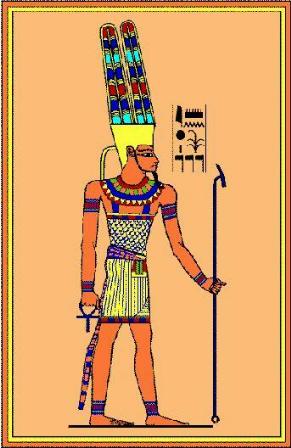Amoun
(prehistoric/mythic)

by T. Apiryon
Copyright © 1995 Ordo Templi Orientis. All rights reserved.

Also known as Amon, Ammon, Amun and Amen. Egyptian god known as "King of the Gods" and "Lord of Heaven," Nome-god of Thebes (Uast, near present-day Qus), consort of Hathor (or of Mut), and father of Khonsu. The Romans identified him with Jupiter.
The name Amoun means "hidden." Amoun was the vassal of Mentu until he displaced him as the principle god of Upper Egypt, later becoming identified with the sun god under the name Amon-Ra.
Amoun is usually depicted as a human male clad in an apron and breastplate, wearing a crown with two ostrich plumes, holding a phoenix wand in his left hand and an Ankh in his right hand. He is also occasionally depicted as the potter with the wheel, fashioning the primal egg of generation; or, like Krishna, as a black lingham. His sacred animals were the ram and the goose. The Hebrew exclamation Amen, "verily," probably derives from the Egyptian custom of taking oaths in the name of Amoun. In Isaiah (lxv, 16) the "God of Truth" is in Hebrew Elohi-Amen.
References:
Budge, Sir E.A. Wallis; The Gods of the Egyptians [1904], Dover, NY 1969
Forlong, J.G.R.; Faiths of Man, a Cyclopaedia of Religions [Bernard Quaritch, 1906], University Books, NY 1964
Viaud, J.; "Egyptian Mythology" in The New Larousse Encyclopedia of Mythology, Hamlyn, NY 1959/1968
5/11/95
Originally published in
Red Flame No. 2 -- Mystery of Mystery: A Primer of Thelemic Ecclesiastical
Gnosticism
by Tau Apiryon and Helena; Berkeley, CA 1995 e.v.